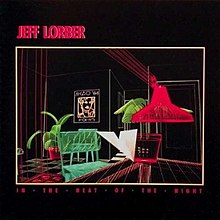1984 studio album by Jeff Lorber From Wikipedia, the free encyclopedia
In the Heat of the Night is the second solo studio album by jazz keyboardist Jeff Lorber.[3]
| In the Heat of the Night | ||||
|---|---|---|---|---|
 | ||||
| Studio album by | ||||
| Released | July 26, 1984 | |||
| Genre | ||||
| Label | Arista | |||
| Producer | Jeff Lorber, Maurice Starr | |||
| Jeff Lorber chronology | ||||
| ||||
| Singles from In the Heat of the Night | ||||
| ||||
| Review scores | |
|---|---|
| Source | Rating |
| AllMusic | |
| The Rolling Stone Jazz Record Guide | |
The album peaked at No. 7 on the Traditional Jazz Albums chart and No. 44 on the Top Black Albums chart.
Its artwork consists of a still image from a 1982 commercial promoting the acquisition of American electronic brand Quasar from Motorola to Matsushita Electric Industrial, which is now Panasonic.
| No. | Title | Writer(s) | Length |
|---|---|---|---|
| 1. | "In the Heat of the Night" | Maurice Starr | 4:14 |
| 2. | "Really Scarey" | Jeff Lorber, Nathan East | 4:08 |
| 3. | "Don't Say Yes" | Jeff Lorber, Tony Haynes, Marlon McClain | 4:07 |
| 4. | "Tropical" | Jeff Lorber | 4:12 |
| 5. | "Sushi Monster" | Jeff Lorber, Nathan East, Marlon McClain | 3:14 |
| 6. | "Rock II" | Jeff Lorber | 4:26 |
| 7. | "Seventh Heaven" | Jeff Lorber, Marlon McClain | 4:21 |
| 8. | "Double Bad" | Jeff Lorber, Joe Ericksen, Jack Robinson | 4:18 |
| 9. | "Blast Off" | Maurice Starr | 3:45 |
| 10. | "Water Fall" | Jeff Lorber | 4:07 |
Studios
| Chart (1984) | Peak position |
|---|---|
| Billboard 200[4] | 106 |
| Billboard Top Black Albums[5] | 44 |
| Billboard Top Jazz Albums[6] | 7 |
Seamless Wikipedia browsing. On steroids.